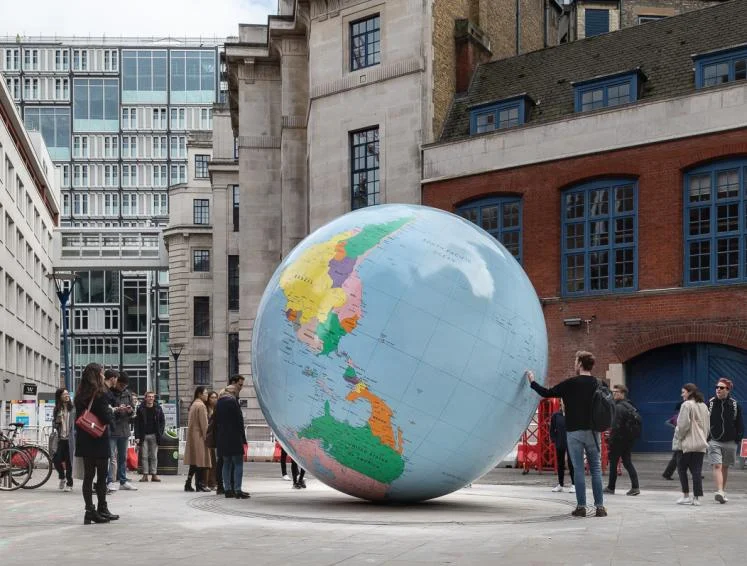LSE takes a lead on sustainability

LSE’s annual Sustainability Report 2023/24, published this month, highlights the School’s ongoing commitment to environmental sustainability.
Driven by the School’s senior leadership team, this year’s report illustrates how sustainability has been integrated into key areas across the university including education, research, engagement and leadership, investment and collaboration – as set out in LSE’s .
LSE was sector-leading in making positive changes during the 2023/24 academic year and the School was ranked as the UK’s top university in "environmental sustainability" in the 2024 QS Sustainability Rankings (and second worldwide).
The new report spotlights the recent launch of LSE’s Global School of Sustainability (GSoS). A centre of expertise, the new Global School brings together world-leading experts to inform policy on the economic growth, social inclusion and environmental protections crucial to ensuring a sustainable future.
Building on and complementing the work of the Grantham Research Institute for Climate Change and the Environment at LSE, GSoS will provide training and development to future leaders through scholarship support, and pioneer research through innovative projects and the Global Sustainability Research Fund.
Ongoing work by the Grantham Institute features prominently in this year’s report, including their significant presence at COP28, where representatives took part in a variety of events, policy analysis and commentaries, ranging from climate-smart agriculture and intergenerational equity to climate governance for a just and resilient transition to net zero.
Around campus, LSE’s newest building, the Firoz Lalji Global Hub, will be the School’s first net-zero building (in construction and operation) that is also PassivHaus (has highly efficient building design), BREEAM Outstanding (sustainable building certified), and WELL Platinum certified (based on wellbeing and health).
In addition, LSE was recently awarded £2.7m in funding under the Public Sector Decarbonisation Scheme, which was matched by the School for the implementation of carbon reduction measures. This funding is a crucial step forward in LSE’s Sustainability Strategic Plan – accelerating the further decarbonisation of the university’s buildings; in line with the ambitious targets set by the UK Government to reduce carbon emissions.
In the 2023/24 academic year, LSE partnered with Hazaar to host sustainable pop-up markets on campus. These markets encourage students and staff to buy and sell second hand items, reducing waste and promoting reuse.
The School also continued its partnership with the London Heritage Quarter. Collaborating on Dr Bike sessions – providing free bike maintenance to LSE staff and students, participating in a city cleanup, and also attending a fashion show and panel discussion focused on the importance of sustainability within the beauty and fashion industry.
In terms of education, the Eden Centre recently launched the Education for Sustainability Internship Programme, enabling student interns to work with academic staff to embed sustainability into the curriculum.
And in March 2024, the LSE Phelan United States Centre launched the Syllabus Hub on Climate Change and Sustainability – an innovative resource designed to assist academic staff in integrating sustainability themes into their curricula. The Hub offers a collection of over 40 syllabuses related to climate change and sustainability. By utilising the Syllabus Hub, academic staff can design courses that address sustainability challenges, promote critical thinking, and prepare students to engage in global environmental issues.
Going forwards, LSE is working to achieve one of its big targets of becoming net zero carbon by 2030 for direct energy use (scope 1 and 2) and by 2050 for all indirect emissions (scope 3), through continuing to deliver on the carbon reduction initiatives set out in the Sustainability Strategic Plan.
Commenting on the Sustainability report, LSE President and Vice Chancellor Larry Kramer said: "Addressing the climate and sustainability crises is a job for social scientists, and as a world-leading social sciences university with a global community, LSE must go beyond just providing ideas that drive solutions – it must lead the way by setting an institutional example of how to holistically empower people to tackle environmental and social challenges.
"As proud as we are of the progress we made this year, we know we must go further. Challenges of this scope and nature require us to continuously push ourselves beyond what we’ve done already. Success relies on the collective efforts of our LSE community: students, academics, professional staff, alumni and partners. The progress we have made this year will serve as a catalyst for future advancements, and we are optimistic about the next stages of our journey to make this fantastic university a sustainable one as well."
To find out more about sustainability at LSE and read relevant news and updates, please visit our Sustainability webpage